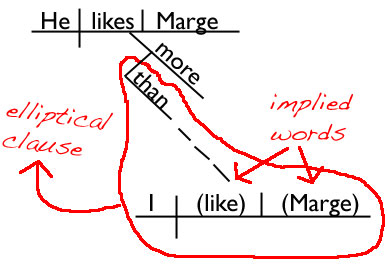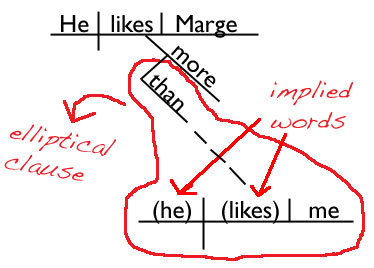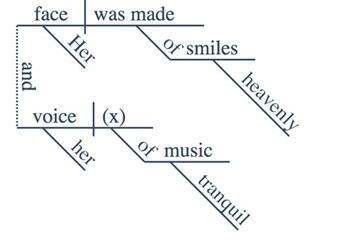Download your free grammar guide here.
Download your free grammar guide here.
An elliptical clause is a clause with implied words. It's usually an adverb clause.
An elliptical clause is a clause with implied words.
It's usually an adverb clause.
What is an elliptical clause? What is an adverb clause? An elliptical clause is a type of clause that has implied words. It's usually a type of dependent adverb clause.
Do you remember learning about those? Don't fret if you don't remember. Here's a quick refresher on the important stuff.
Quick Refresher
Adverbs modify verbs, adjectives, and other adverbs.
Clauses are groups of words with a subject and a verb.
Subordinate clauses are clauses (groups of words with a subject and a verb) that don't express a complete thought. They act as one part of speech.
Adverb clauses are subordinate clauses that act as adverbs.
What is an elliptical clause?
What does it take for a group of words to be an elliptical clause? Well, there are two things that every elliptical clause must have. You can even use these as a short checklist to help you identify elliptical clauses out there in the world.
The Elliptical Clause Checklist
1) It must be a group of words with a subject and a verb. This is what makes it a clause. The subject and/or the verb may be implied, and that can make them tricky to spot.
2) It has one or more implied words. The subject might be implied, the verb might be implied, or another word might be implied. This is what makes it an elliptical clause!
Now we're going to learn more about elliptical clauses with the help of three examples.
1) More than I
He likes Marge more than I. --->
He likes Marge more than I (like Marge).
That example is made up of an independent clause and a subordinate clause.
The independent clause is He likes Marge more, and the subordinate clause is than I (like Marge).
We're not interested in the independent clause in this lesson, so we're just going to focus on the subordinate elliptical clause.
The words than I (like Marge) are an elliptical clause.
The Checklist
- Is it a group of words with a subject and a verb?
Yep! (subject = I, verb = like) This means it's a clause.
- Does it have implied words?
Yep! (like Marge) This means it's an elliptical clause.
This whole clause is acting as an adverb. Than I (like Marge) is modifying the adverb more. This means it's an elliptical adverb clause.
Diagramming Elliptical Clauses
Check out this sentence diagram, and you can see how to diagram an elliptical clause. Put the implied words in parentheses.
Notice that with the diagram, it's easy to tell that the subordinate elliptical clause is acting as an adverb modifying the adverb more.

2. More than me
He likes Marge more than me. --->
He likes Marge more than (he likes) me.
Woah! Did you notice the giant change in meaning we have in this example from the first example, and we only changed one word?! Crazy, huh?
What a difference a word can make!
The words than (he likes) me are an elliptical clause.
The Checklist
- Is it a group of words with a subject and a verb?
Yep! (subject = he, verb = likes) This means it's a subordinate clause.
- Does it have implied words?
Yep! (he likes) This means it's an elliptical clause.
The whole clause is acting as an adverb. Than (he likes) me is modifying the adverb more. This means it's an elliptical adverb clause.
Diagramming this Elliptical Clause

3. Her face was made of heavenly smiles, and her voice of tranquil music.
In the first two examples, the elliptical clauses were adverb clauses, and that's what you'll find most often. However, you can also have an elliptical clause that is not an adverb clause.
In this example sentence, which is from Narrative of the Life of Frederick Douglass by Frederick Douglass, it's the verb in the second independent clause that is implied.
Her face was made of heavenly smiles, and her voice of tranquil music. --->
Her face was made of heavenly smiles, and her voice (was made) of tranquil music.

If you'd like to teach or learn grammar the easy way—with sentence diagrams—check out our Get Smart Grammar Program.
It starts from the very beginning and teaches you grammar and sentence diagramming in easy, bite-size lessons.

Hello! I'm Elizabeth O'Brien, and my goal is to get you jazzed about grammar.
Thank you for an excellent program.
- Faith, Classroom Teacher
This is original content from https://www.english-grammar-revolution.com/adverb-clause.html
Our Free Guide Gives You A Fun Way
To Teach And Learn The Basics v

Elizabeth O'Brien is the creator of Grammar Revolution.
Her lessons are guaranteed to give you more confidence in your communication skills and make you smile. :)

